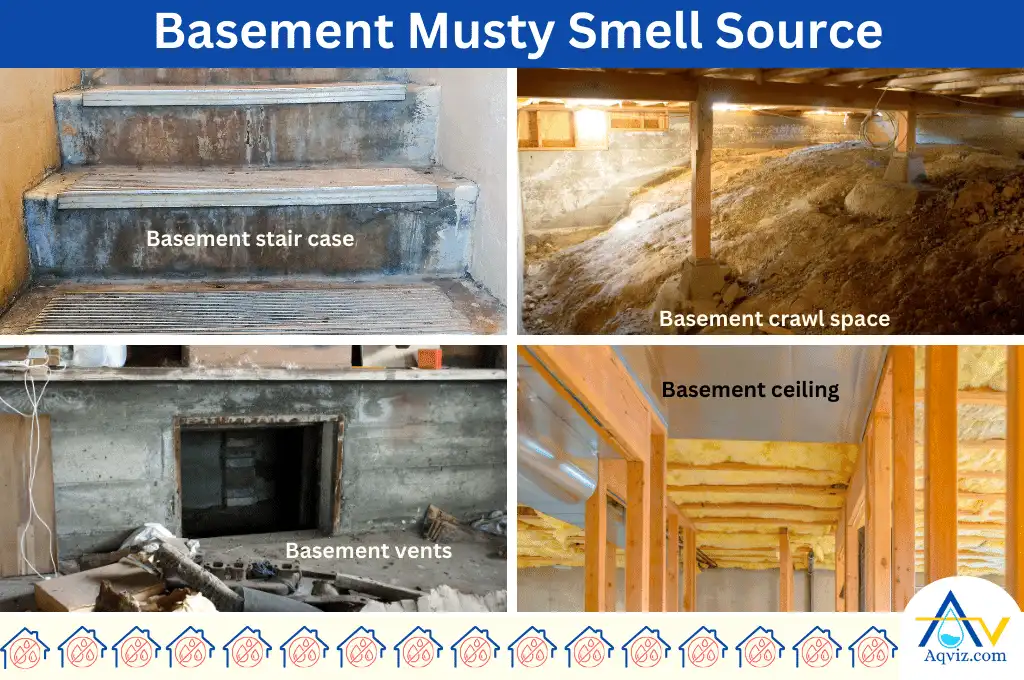Musty Basement Smell: Causes, Problems and Solutions

The musty smell in the basement is the presence of mold or mildew due to excess water. The musty smell comes from the damp, dark, poorly ventilated areas in the basement, such as under the staircase, crawl space, basement vents, and ceiling. The musty smell can rise from the basement due to mold and mildew growth, sewage line damages, plumbing leaks, basement flooding, dampness, poor ventilation, and higher organic matter in the basement.
This bad smell rises from the basement after the rain, after the flooding, and during the summer due to poor ventilation and higher water accumulating in the cellar area. You can avoid this bad smell by waterproofing the basement, improving the ventilation, cleaning and disinfecting, installing vapor barriers, sealing basement leaks, and using dehumidifiers in the basement.
Mold smell and musty smell are two different types. Mold doesn’t generate a smell by itself during the release of reproductive spores. Mold emits smells by releasing VOC byproducts as it grows and feeds on organic materials.
What is a Musty Basement Smell?
The musty smell in the basement is the presence of mold or mildew due to excess water. The musty smell can be described as a damp, stale, or earthy smell from the basement. The musty smell comes from the damp, dark, poorly ventilated areas in the basement.
The two main reasons for the musty smell in the basement are excess moisture and humidity. The long-term exposure due to a musty smell can lead to a bad user experience, structural damage, and health problems. Hence, you should know about basement waterproofing methods and ways to stop water from leaking in.

What are the Causes Musty Basement Smell?
Musty basement smell occurs due to mold and mildew growth, sewage line damage, plumbing leaks, basement flooding, dampness in the basement, poor ventilation, and higher organic matter in the basement.
- Mold and mildew growth in the basement: The mold and mildew in the basement can cause to musty smell in the basement. Mold and mildew can grow in higher dampness, less ventilation, and dark areas in the basement. The musty odor is not as strong as mold. But the musty smell is a sign of mold growth in the basement.
- Sewage line damage in the basement: The sewage line damage in the basement can accumulate sewage water in the basement through cracks and holes in the basement walls and floor. Less ventilation and prolonged water remaining can cause a musty smell in the basement.
- Plumbing leaks in the basement : Plumbing leaks in the basement can create water stagnation close to the basement. The stagnant water is a good breeding place for bacteria and pests. Bacteria and pets emit various musty odors during their respiration and reproduction processes.
- Flooding in the basement: Basement flooding causes to musty smell in the basement. Flooded water in the basement can collect rubbish, organic matter, and debris, which can cause to generate earthy smells in the basement. Also, stagnant water places can generate pungent smells.
- Dampness in the basement: Basement musty smell increases with higher dampness in the basement. A damp environment is ideal for the growth of bacteria, mold, and fungi. These microorganisms emit musty smells during their respiration and reproduction processes.
- Poor ventilation and darkness in the basement: Poorly ventilated, dark areas are suitable for mold, bacteria, and fungi growth in the basement. They can spread musty and earthy smells during their body functions.
- Higher organic matter in the basement: Higher organic matter can react with debris and chemicals in the basement and generate pungent smells in the basement area.
To prevent basement musty odor you should follow this How to Waterproof the Basement? Interior, Exterior and Drainage

What are the Sources of Basement Musty Odor?
The basement’s musty smell comes from these sources, such as under the basement staircase, crawl space, vents, and the basement ceiling.
- Basement staircase: Musty smells can come out under the basement staircase. The latter parts of the cellar are poorly ventilated, dark, and rarely exposed to sunlight.
- Basement crawl space: Musty smells can come out of the floors of the crawlspace, which are exposed to mold and water accumulation. Musty smells can come out due to high moisture levels, dampness, and low ventilation.
- Basement vents: Parts of the basement vents exposed to high humidity generate musty gases. Basement vents can spread musty smells due to high humidity levels.
- Basement ceiling: Corners and plumbing lines near the ceiling have a high possibility of emitting musty smells into the basement. Due to high moisture conditions, low ventilation, and condensation, harmful gases over the base space.

When Does Basement’s Musty Smell Come?
A basement’s musty smell can rise after the rain, after the basement floods, and during the summer season. There are reasons for these periods.
- Basement musty smell after rain: The musty smell in the basement comes after the rain due to an increase the humidity in the air. More than that, prolonged rain can increase the water table, which causes the basement to leak and accumulate water inside. This caused water flooding and water stagnation in the basement, which caused to musty smell in the basement.
- Basement musty smell after flooding: Basement’s musty smell increases after flooding due to high moisture and humidity levels. Also, basement flooding can bring rubbish, organic matter, sewage, and chemicals, and they will react and emit harmful gases. Also, stagnant water places will be spoiled and emit earthy smells.
- Basement musty smell in the summer: Basement musty smells increase during summer due to high moisture levels and poor ventilation. During the summer, the indoor basement is much cooler and highly humid. This can grow bacteria and mold and increase the musty and earthy smells.
What are the Problems Due to a Musty Basement Smell?
A basement musty odor raises many problems that can affect the structure, user, and environment. The major problems due to the basement’s musty smell are structural damage, reduced home values, pest infestation, damage to the items in the basement, increased maintenance costs, and health hazards for the users.
- Structural damage in the basement: A basement musty smell can damage the structure by providing dampening and lower ventilation areas. Dampness can ruin the structural integrity and weaken the structures due to rotting, deterioration, and warping of the construction materials. These structural damages will reduce the quality and value of the basement.
- Reduce home value: Musty smells reduce home value by emitting unpleasant air over the cellar. Damaged and musty smells from the basement will reduce the user experience and property value as well.
- Increase pest infestation: Basement musty smells can attract and provide a breeding ground for pests and bacteria. They will emit poisonous gases, spread diseases, and reduce the air quality of the basement.
- Damage to stored items in the basement: Basement musty smells can increase mold growth and bacteria, and fungi development. These microorganisms can grow on fabric items, cardboard, and other stored items in the basement. They will damage and reduce the quality of those stored items.
- Increase maintenance cost: To remove musty smells, users need to use dehumidifiers, air fresheners, and other fragrance-generating components. This will cost additional expenses and increase the maintenance cost.
- Increase health hazards: Basement musty smells can cause respiratory issues, skin rashes, sneezing, and allergies. Also, pets like mosquitoes and bacteria transmit diseases and damage the immunity of users.
How to Get Rid of a Musty Smell in the Basement?
Basement’s musty smell can be stopped by following these 6 methods, such as waterproofing the basement, improving the basement ventilation, cleaning and disinfection the basement, installing a vapor barrier, and using a dehumidifier in the basement.
- Waterproof the basement: Waterproofing the basement will prevent high humidity, moisture accumulation, and water seepage. This will reduce the possibility of musty odors. We can waterproof the basement using hydraulic cement, epoxy sealants, waterproofing coatings, and waterproofing membranes.
- Improve basement ventilation: You should improve the basement ventilation by installing new windows, installing wire meshes, opening up doors and windows, and creating openings to enter sunlight, because low ventilation can increase the musty smells in the basement area.
- Clean and disinfect the basement: You should clean the basement using activated charcoal, baking soda, vinegar, phenol, and commercial odor eliminators because musty smells can be generated due to mold, bacteria, and pests.
- Install a vapor barrier: Vapor barriers can control moisture movement, prevent condensation, and improve air circulation in the basement. These actions will maintain optimum humidity and moisture and control musty smells.
- Seal the basement leaks: You can prevent the basement smell by sealing basement cracks because water can seep through the basement leaks and accumulate in the basement, generating musty smells. You can use epoxy sealant, hydraulic cement, waterproofing, painting, and injecting materials.
- Use a dehumidifier: You can avoid the basement musty smell by maintaining the humidity level to an optimum level using a dehumidifier because higher humidity levels tend to increase mold growth and dampen the atmosphere to release musty gases. To eliminate this, you can use a dehumidifier.
Related: Basement Leaking: Causes, Sources, Damages, Repairs and Preventions

What is the Mold Smell in the Basement?
The mold smell in the basement is typically caused by the presence of mold or mildew growth. Mold doesn’t generate a smell by itself during the release of reproductive spores. It reacts with other organic compounds to feed and grow in the basement, such as wood types, papers, and surfaces. Then, it releases a byproduct called Volatile Organic Compounds (VOC), which releases harmful odors in the basement to release harmful gases.
Basement mold can grow and develop due to reasons such as basement flooding , less exposure to sunlight, high humidity and moisture levels, leaks in the plumbing and water lines, basement cracks, and high concentrations of organic matter.
Is Musty Smell the Same as Mold?
A musty smell is an indicator that alarms about the presence of mold and issues in the moisture level. However, mold is a cause that doesn’t emit an odor by itself. Mold emits smells by releasing VOC byproducts as they grow and feed organic materials.
The smells that mold generates by reproductive spores can be not very intense and sometimes can be odourless. But musty smells can be highly intense and poisonous as well. Mold is only a reason for musty smells, but there can be many other reasons that cause musty smells, such as overflowing drains, damp fabrics, improper ventilation, and high humidity.
